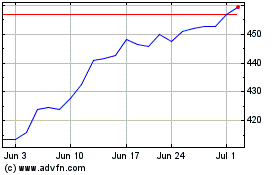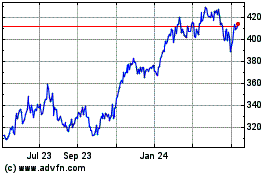Facebook Inc. published on Tuesday new details on how it
conducts research using the personal information it collects on
Facebook users, amid a flurry of efforts to create privacy and
ethical standards for the corporate research involving human
data.
Facebook collects data on roughly 1.6 billion people, including
"likes" and social connections, which it uses to look for
behavioral patterns such as voting habits, relationship status and
how interactions with certain types of content might make people
feel. In June 2014, Facebook published a study about a
700,000-person psychological test to determine whether omitting
content with words associated with positive or negative emotions
could alter mood. The study sparked controversy about the company's
ethics.
In October 2014, Facebook had announced it was adding an
internal review process but declined to divulge specifics.
Because "the issues of how to deal with research in an industry
setting aren't unique to Facebook," the company decided to release
more details, said Molly Jackman, Facebook's public-policy research
manager and co-author of the paper published in Washington and Lee
Law Review.
To assess the ethical impact of each research effort, the Menlo
Park, Calif., company has established a five-person standing group
of Facebook employees, including experts in law and ethics.
The company declined to identify the five members of the board,
which can consult outside experts if deemed necessary.
If a manager determines that a research project deals with
sensitive topics such as mental health, the study gets a detailed
review by the group to weigh risks and benefits, as well as to
consider whether it is in line with consumers' expectations of how
their information is stored.
Managers have the authority to simply approve proposals that
they deem more innocuous. Which research gets a full review is up
to the discretion of the manager.
The review group is modeled on the institutional review boards,
or IRBs, that assess the ethics of human-subject research at
academic institutions. Facebook hired longtime Stanford University
IRB manager Lauri Kanerva, who co-wrote the paper, to oversee its
research review process.
The publication comes as tech companies are grappling with how
to ensure the ethical conduct of research using their customers'
personal data.
Dealing with research ethics is "definitely an emerging field
that everyone in the industry is struggling with," said Joetta
Bell, senior compliance program manager at Microsoft Corp., who led
the ethical review board that the company's Microsoft Research arm
launched in 2015.
The amount of information companies such as Facebook collect on
people enables their researchers to study a "deeper and broader"
cross-section of the population than ever before, said Jeremy
Birnholtz, a communications professor at Northwestern University
who worked at Facebook last year as a research fellow studying the
company's data.
Tech companies are increasingly hiring academics from fields
ranging from the life sciences to artificial intelligence to mine
social-media data, internet searches, purchasing behavior and
publicly available data sets to improve their products, place ads
and track health trends. Last week, for instance, Microsoft
published a study that suggests that search queries could provide
clues that a person might have cancer, even before a diagnosis. In
2013, the company used searches to detect adverse effects of
drugs.
Government officials are proposing changes to federal policies
that regulate human research, known as the Common Rule that would,
among other things, make it easier for research participants to
give scientists broad consent to use their data and tissue samples
for future studies.
But that regulation "doesn't apply to private companies like
Facebook, which don't accept any federal research funds," said
Michelle Meyer, the director of bioethics policy for the
Clarkson-Icahn School of Medicine at Mount Sinai bioethics
program.
"Certainly, tech companies have not had IRBs," which are often
regarded as bureaucratic, said Duncan Watts, a principal researcher
at Microsoft Research. But that is changing, he said.
Some, including gene-sequencing company 23andMe, hire an
external IRB to vet the majority of their research proposals,
according to 23andMe's vice president of research Joyce Tung. Its
review process has been in place since around 2008.
Microsoft and wearables maker Fitbit Inc. also contract with
external IRBs for some of their research projects. The rest are
largely reviewed internally. A subset of Fitbit's research
undergoes an ethics review described in a report published in
collaboration with the Center for Democracy and Technology in
May.
"Within the entire industry, there's a lot of people doing
experiments, and there's no visibility on how they're doing it,"
said Fitbit's vice president of research Shelten Yuen. "We wanted
to disseminate [our process]...so that startups wouldn't have to
reinvent this for themselves."
Write to Deepa Seetharaman at Deepa.Seetharaman@wsj.com
(END) Dow Jones Newswires
June 14, 2016 16:35 ET (20:35 GMT)
Copyright (c) 2016 Dow Jones & Company, Inc.
Microsoft (NASDAQ:MSFT)
Historical Stock Chart
From Mar 2024 to Apr 2024

Microsoft (NASDAQ:MSFT)
Historical Stock Chart
From Apr 2023 to Apr 2024
